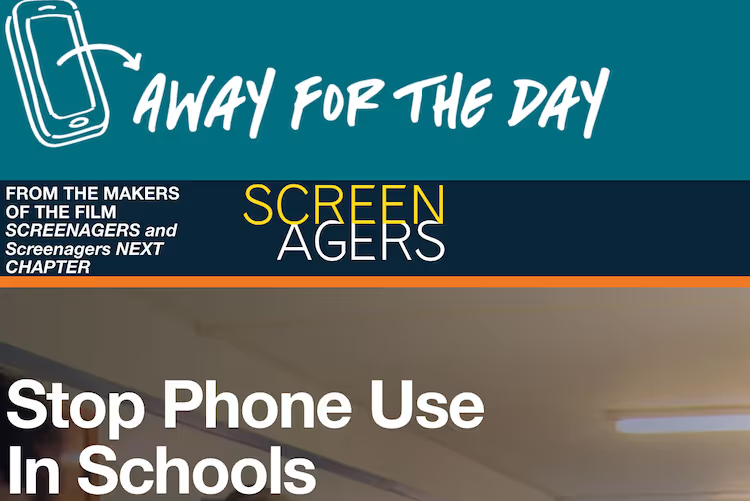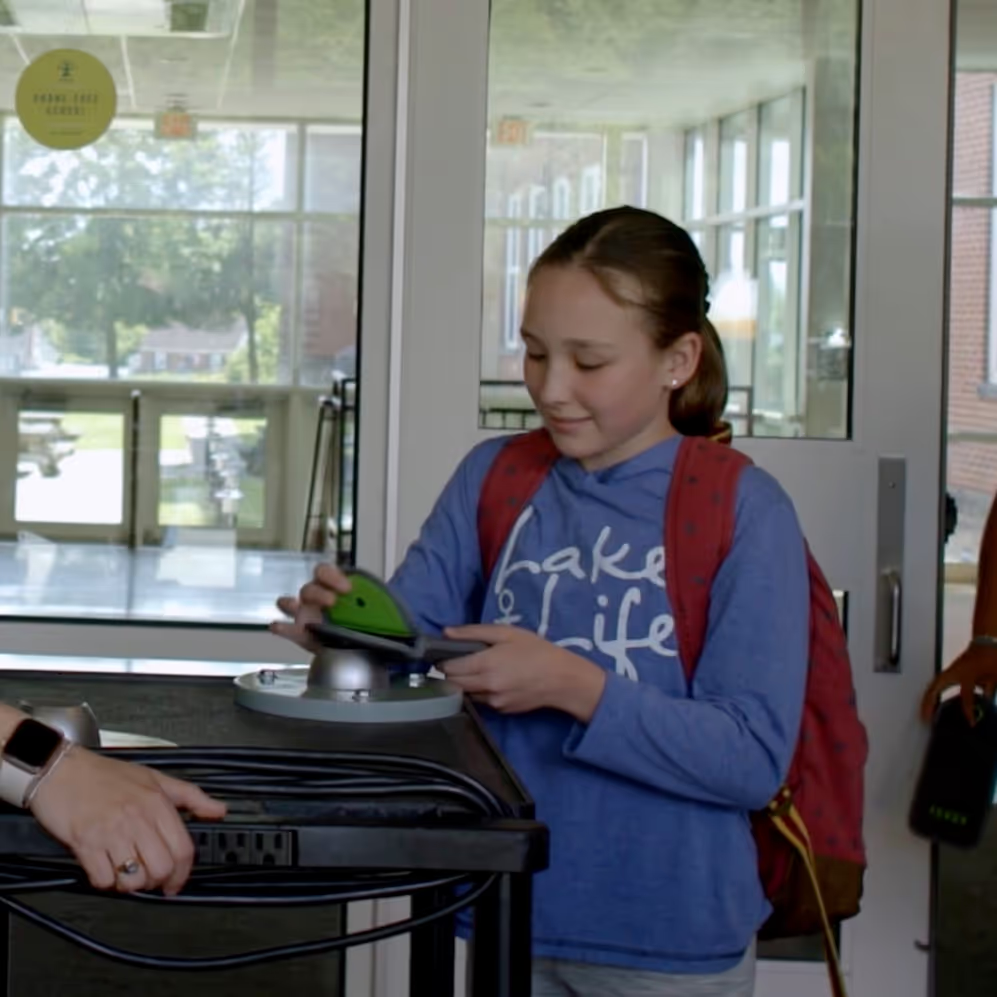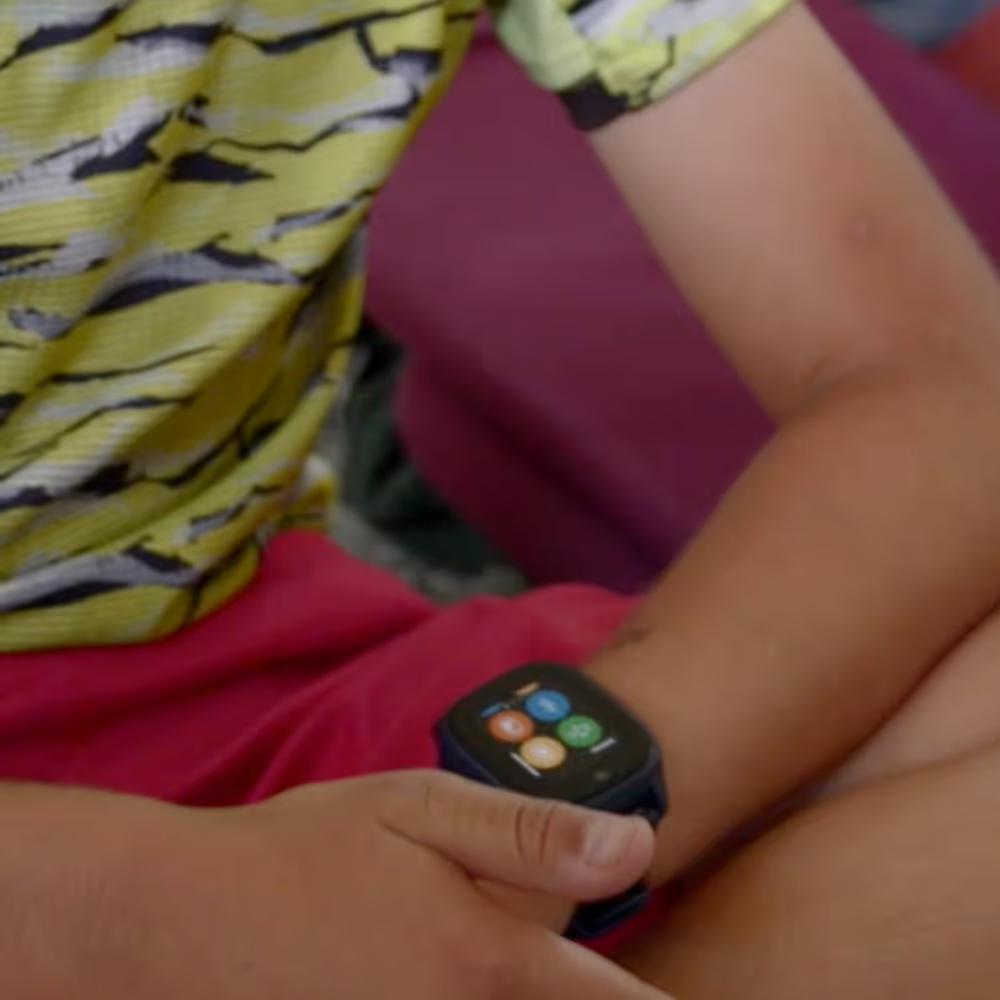


Educators and parents around the globe are banding together to help students emotionally, socially, and academically. How? They are creating new policies to keep personal electronic devices, particularly cell phones, smartwatches, and other personal tech, away for the day at school. (When I use the word phones throughout this article, I am referring to all non-school-issued personal tech.)
This is wonderful news because research consistently shows many benefits of having phones away for the day. Research also shows that the majority of students believe that their devices are negatively impacting their ability to concentrate and study and that they need help regulating their use.
I am immensely proud that our ongoing campaign, launched in 2017, called Away For The Day, has helped many parents and educators bring policies to their schools that limit phone use — be it elementary and middle schools where phones are kept in lockers or backpacks all day, or high schools where it might be that phones are put in phone pockets during class and may or may not state rules during breaks and lunchtime.
Today I want to hit on five areas meant to inspire and prepare you to reach out to friends and colleagues to discuss what you want to see in your school and how to make that happen. And, of course, to have fodder to talk with your kids at your Tech Talk Tuesday.
The Netherlands just announced that they are asking all primary schools (5 through 12 years) to create policies that keep phones away for the day this coming academic year. Like all places that have away-for-the-day policies, The Netherlands cites exceptions, such as for students with diabetes, or other medical conditions, for which they need a phone.
Finland announced last month that it would also help schools set policies limiting mobile devices. (Not to be confused with Finlands’ cell-phone-free tourist island 😀)
France continues to have their country-wide policy of phones away for the day in all primary schools.
Many other countries, such as Australia and England, are working on similar initiatives.
And finally, something a bit different but related, in Ireland, parents and school officials from eight schools have joined forces to no longer have primary school-age kids own smartphones. There is some leeway for simple phones earlier for contacting parents for rides and such. Wow, talk about aligning a lot of people!
On the Away For The Day website, we have a popular section called “pushbacks.” The page has many answers to common concerns from parents and administrators regarding these policies.
One of the most common myths is that in the event of a school shooter, it benefits students to have phones. This is false. On the pushback page, we cite many reasons that law enforcement experts do not want students to have phones — calls can block radio signals, and they can notify the shooter where students are hiding, among other risks.
Another myth I hear from adults is that monitoring and enforcing such policies is just too hard. Yes, it takes work, and there will be transgressions, but the downside of continuing as we are leads to more problems — i.e., more mental health problems. To this point, let me share a quote from a superintendent in New York, Wiliam Dorritie, who brought Away For The Day to his district:
“I would much rather enforce the new policy than have students experiencing significant emotional distress and cyberbullying through social media during school hours.”
If you want to hear from other teachers who have brought Away For The Day to their schools, check out more videos here.
Learn more about showing our movies in your school or community!
Join Screenagers filmmaker Delaney Ruston MD for our latest Podcast

Learn more about our Screen-Free Sleep campaign at the website!
Our movie made for parents and educators of younger kids
Learn more about showing our movies in your school or community!
The more phone use in school, the more teens are exposed to countless images and videos that show peers, influencers, celebrities, and ads of substance use — be it vaping, drinking, or other. These posts can be a definite trigger for those teens who, for example, vape nicotine or weed. Several teens I have spoken to have told me this.
One teen said, “When I see videos of people vaping, I get an urge to want to do the same thing, and then I am really distracted.”
Our new film about teens and substances, Screenagers Under The Influence, explores the disturbing fact that through social media platforms, students can be fed messages about buying illicit drugs even when they aren’t looking to do so.
To this point, a recent podcast episode of Your Undivided Attention features Laura Marquez Garrett, an attorney at the Social Media Victims Law Center, and in the podcast notes, she states, "Failed policies and product features are the result of a values-blind economy that doesn’t perceive externalities. Social media companies can’t argue that they’re giving kids what they want because Laura’s team has shown that kids are getting drugs pushed to them on social media without seeking them out, for instance. We need to be aware of the unhealthy races around us to see and understand the underlying incentives that motivate them.”
Recent nationally representative data published from a sample of youth aged 13 to 17 found
70% of girls and 75% of boys said they had watched online pornography. Of those who watched it intentionally, 70% had done so in the past week.
The researchers found that 40% said they had watched pornography during the school day! AND, 80% said they had seen “what appears to be rape, choking, or someone in pain.”
The study shows that 50% of those surveyed who had seen porn said they felt “guilty or ashamed” after watching porn.
This porn example is just one example of the many things available to our students throughout the day on their personal devices that can lead them into emotional darkness.
Learn more about showing our movies in your school or community!
Join Screenagers filmmaker Delaney Ruston MD for our latest Podcast

Learn more about our Screen-Free Sleep campaign at the website!
Our movie made for parents and educators of younger kids
Join Screenagers filmmaker Delaney Ruston MD for our latest Podcast
I am not talking about test-taking and cheating. I am thinking about the constant pull to get answers from tech when, say, in a group discussion or when I need to write down ideas. Having all students on the same playing field to discuss topics, free from the web and its ideas, is the vision I want for our students.
If you do this one small thing
It was hard for me to limit this TTT blog to just the five points above because there are so many other reasons that limiting personal devices benefits our kids.
But I didn’t want to exhaust you; I wanted to inspire you. I hope you are motivated to call one friend or a colleague to talk about what you want to see at your school. That one small call can start something really big.
1. What was the policy at your school last year regarding phones (and smartwatches and other personnel tech)?
2. What do you think it will be next year?
3. Did you know private schools are more likely to have Away For The Day policies than public schools?
4. Do you think those students have advantages?
As we’re about to celebrate 10 years of Screenagers, we want to hear what’s been most helpful and what you’d like to see next.
Please click here to share your thoughts with us in our community survey. It only takes 5–10 minutes, and everyone who completes it will be entered to win one of five $50 Amazon vouchers.
Educators and parents around the globe are banding together to help students emotionally, socially, and academically. How? They are creating new policies to keep personal electronic devices, particularly cell phones, smartwatches, and other personal tech, away for the day at school. (When I use the word phones throughout this article, I am referring to all non-school-issued personal tech.)
This is wonderful news because research consistently shows many benefits of having phones away for the day. Research also shows that the majority of students believe that their devices are negatively impacting their ability to concentrate and study and that they need help regulating their use.
I am immensely proud that our ongoing campaign, launched in 2017, called Away For The Day, has helped many parents and educators bring policies to their schools that limit phone use — be it elementary and middle schools where phones are kept in lockers or backpacks all day, or high schools where it might be that phones are put in phone pockets during class and may or may not state rules during breaks and lunchtime.
Today I want to hit on five areas meant to inspire and prepare you to reach out to friends and colleagues to discuss what you want to see in your school and how to make that happen. And, of course, to have fodder to talk with your kids at your Tech Talk Tuesday.
The Netherlands just announced that they are asking all primary schools (5 through 12 years) to create policies that keep phones away for the day this coming academic year. Like all places that have away-for-the-day policies, The Netherlands cites exceptions, such as for students with diabetes, or other medical conditions, for which they need a phone.
Finland announced last month that it would also help schools set policies limiting mobile devices. (Not to be confused with Finlands’ cell-phone-free tourist island 😀)
France continues to have their country-wide policy of phones away for the day in all primary schools.
Many other countries, such as Australia and England, are working on similar initiatives.
And finally, something a bit different but related, in Ireland, parents and school officials from eight schools have joined forces to no longer have primary school-age kids own smartphones. There is some leeway for simple phones earlier for contacting parents for rides and such. Wow, talk about aligning a lot of people!
On the Away For The Day website, we have a popular section called “pushbacks.” The page has many answers to common concerns from parents and administrators regarding these policies.
One of the most common myths is that in the event of a school shooter, it benefits students to have phones. This is false. On the pushback page, we cite many reasons that law enforcement experts do not want students to have phones — calls can block radio signals, and they can notify the shooter where students are hiding, among other risks.
Another myth I hear from adults is that monitoring and enforcing such policies is just too hard. Yes, it takes work, and there will be transgressions, but the downside of continuing as we are leads to more problems — i.e., more mental health problems. To this point, let me share a quote from a superintendent in New York, Wiliam Dorritie, who brought Away For The Day to his district:
“I would much rather enforce the new policy than have students experiencing significant emotional distress and cyberbullying through social media during school hours.”
If you want to hear from other teachers who have brought Away For The Day to their schools, check out more videos here.
The more phone use in school, the more teens are exposed to countless images and videos that show peers, influencers, celebrities, and ads of substance use — be it vaping, drinking, or other. These posts can be a definite trigger for those teens who, for example, vape nicotine or weed. Several teens I have spoken to have told me this.
One teen said, “When I see videos of people vaping, I get an urge to want to do the same thing, and then I am really distracted.”
Our new film about teens and substances, Screenagers Under The Influence, explores the disturbing fact that through social media platforms, students can be fed messages about buying illicit drugs even when they aren’t looking to do so.
To this point, a recent podcast episode of Your Undivided Attention features Laura Marquez Garrett, an attorney at the Social Media Victims Law Center, and in the podcast notes, she states, "Failed policies and product features are the result of a values-blind economy that doesn’t perceive externalities. Social media companies can’t argue that they’re giving kids what they want because Laura’s team has shown that kids are getting drugs pushed to them on social media without seeking them out, for instance. We need to be aware of the unhealthy races around us to see and understand the underlying incentives that motivate them.”
Recent nationally representative data published from a sample of youth aged 13 to 17 found
70% of girls and 75% of boys said they had watched online pornography. Of those who watched it intentionally, 70% had done so in the past week.
The researchers found that 40% said they had watched pornography during the school day! AND, 80% said they had seen “what appears to be rape, choking, or someone in pain.”
The study shows that 50% of those surveyed who had seen porn said they felt “guilty or ashamed” after watching porn.
This porn example is just one example of the many things available to our students throughout the day on their personal devices that can lead them into emotional darkness.
I am not talking about test-taking and cheating. I am thinking about the constant pull to get answers from tech when, say, in a group discussion or when I need to write down ideas. Having all students on the same playing field to discuss topics, free from the web and its ideas, is the vision I want for our students.
If you do this one small thing
It was hard for me to limit this TTT blog to just the five points above because there are so many other reasons that limiting personal devices benefits our kids.
But I didn’t want to exhaust you; I wanted to inspire you. I hope you are motivated to call one friend or a colleague to talk about what you want to see at your school. That one small call can start something really big.
1. What was the policy at your school last year regarding phones (and smartwatches and other personnel tech)?
2. What do you think it will be next year?
3. Did you know private schools are more likely to have Away For The Day policies than public schools?
4. Do you think those students have advantages?
Sign up here to receive the weekly Tech Talk Tuesdays newsletter from Screenagers filmmaker Delaney Ruston MD.
We respect your privacy.
Educators and parents around the globe are banding together to help students emotionally, socially, and academically. How? They are creating new policies to keep personal electronic devices, particularly cell phones, smartwatches, and other personal tech, away for the day at school. (When I use the word phones throughout this article, I am referring to all non-school-issued personal tech.)
This is wonderful news because research consistently shows many benefits of having phones away for the day. Research also shows that the majority of students believe that their devices are negatively impacting their ability to concentrate and study and that they need help regulating their use.
I am immensely proud that our ongoing campaign, launched in 2017, called Away For The Day, has helped many parents and educators bring policies to their schools that limit phone use — be it elementary and middle schools where phones are kept in lockers or backpacks all day, or high schools where it might be that phones are put in phone pockets during class and may or may not state rules during breaks and lunchtime.
Today I want to hit on five areas meant to inspire and prepare you to reach out to friends and colleagues to discuss what you want to see in your school and how to make that happen. And, of course, to have fodder to talk with your kids at your Tech Talk Tuesday.
The Netherlands just announced that they are asking all primary schools (5 through 12 years) to create policies that keep phones away for the day this coming academic year. Like all places that have away-for-the-day policies, The Netherlands cites exceptions, such as for students with diabetes, or other medical conditions, for which they need a phone.
Finland announced last month that it would also help schools set policies limiting mobile devices. (Not to be confused with Finlands’ cell-phone-free tourist island 😀)
France continues to have their country-wide policy of phones away for the day in all primary schools.
Many other countries, such as Australia and England, are working on similar initiatives.
And finally, something a bit different but related, in Ireland, parents and school officials from eight schools have joined forces to no longer have primary school-age kids own smartphones. There is some leeway for simple phones earlier for contacting parents for rides and such. Wow, talk about aligning a lot of people!
On the Away For The Day website, we have a popular section called “pushbacks.” The page has many answers to common concerns from parents and administrators regarding these policies.
One of the most common myths is that in the event of a school shooter, it benefits students to have phones. This is false. On the pushback page, we cite many reasons that law enforcement experts do not want students to have phones — calls can block radio signals, and they can notify the shooter where students are hiding, among other risks.
Another myth I hear from adults is that monitoring and enforcing such policies is just too hard. Yes, it takes work, and there will be transgressions, but the downside of continuing as we are leads to more problems — i.e., more mental health problems. To this point, let me share a quote from a superintendent in New York, Wiliam Dorritie, who brought Away For The Day to his district:
“I would much rather enforce the new policy than have students experiencing significant emotional distress and cyberbullying through social media during school hours.”
If you want to hear from other teachers who have brought Away For The Day to their schools, check out more videos here.

This year, millions of students are experiencing a major shift: school days without phones, smartwatches, or other personal devices. Today we explore the wins, hurdles, and solutions helping schools succeed. We also share our resources that you can use to support technology policy changes in your schools.
READ MORE >
I recently sat down with middle school principal Zach at his school in Washington State. We talked about the challenges Zach and his team faced in his early years as principal when students used phones during school, and how he brought about a powerful transformation by having phones and smartwatches put away in locked pouches for the whole school day. In today’s blog, to raise awareness of the challenges, I share five real examples from Zach of the troubling ways students use phones at school to be unkind.
READ MORE >
It is with great pleasure that I share with you today a piece that Lisa Tabb and I did for Jonathan Haidt's (Author of The Anxious Generation) and researcher Zack Rausch's Substack blog — After Babel. In it, we discuss the rise in use of smartwatches in elementary schools and the problems they pose. There is a real cost to arming (pun intended) our kids with these devices and sending them to school. Now is the time to stop and fully address this topic and ensure that schools become smartwatch and phone-free.
READ MORE >for more like this, DR. DELANEY RUSTON'S NEW BOOK, PARENTING IN THE SCREEN AGE, IS THE DEFINITIVE GUIDE FOR TODAY’S PARENTS. WITH INSIGHTS ON SCREEN TIME FROM RESEARCHERS, INPUT FROM KIDS & TEENS, THIS BOOK IS PACKED WITH SOLUTIONS FOR HOW TO START AND SUSTAIN PRODUCTIVE FAMILY TALKS ABOUT TECHNOLOGY AND IT’S IMPACT ON OUR MENTAL WELLBEING.
